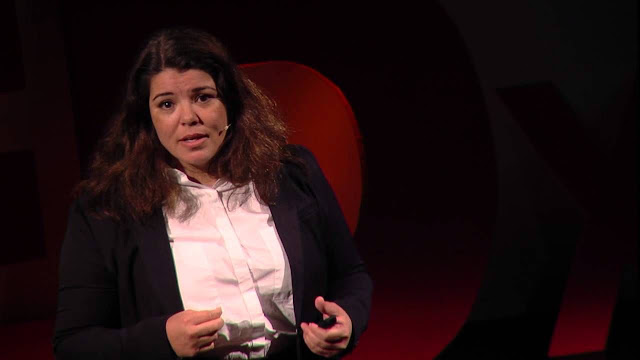TED talk - This Is How You Do It
 |
"If your mouth is open, you are not learning." - Buddha and Celeste Headlee (Photo: TED) |
I’m in lockdown here in Melbourne, so... Really happy there's YouTube. I feel both intrigued by all the good stuff that’s out there, and paralyzed because there are just too many options. I’ve been looking at some TED talks this last couple of days.
(We can’t just watch recipes and Yoga with Adriene all the time, ok?)
(Who am I kidding? That's exactly what I do.)
I don’t find all of the talks absurdly interesting, but some really make me feel like it’s possible to be a functional adult. There’s this speaker, Celeste Headlee, and I’m telling you, she will blow your mind. Her talk “10 ways to have a better conversation” is really on spot.
First, let’s take a look at what a TED (Technology, Entertainment, Design) talk is, so we can better understand its purpose and target audience. TED was founded in Silicon Valley in 1984 and its first conference happened in 1990. As you can imagine, its primary focus was technology and design. That changed overtime, and now the annual congress includes talks on a variety of topics. There are also many spinoffs, like TEDx, TED-Ed, , TEDMED, TEDWomen… You get the picture. But the main TED conference still happens and it’s a big deal.
Although it is organized by a non-profit organization, each attendee pays at least $6,000 to be there. So, you can expect people who are willing to spend a pretty penny on educating themselves. When the camera shows the audience, you can see mostly people in their forties. All well-dressed, but not in an executive kind of way. They look like professors.
I can only imagine the pressure of being on that stage. Even if you are talking about your area of expertise and most of the audience doesn’t know much about that subject in particular, it is still a very intellectual audience. It’s pointless to try to use pompous words and jargon to appear smart, you need to know what you are talking about and express yourself clearly and concisely.
Celeste Headlee owns it. The first thing she says to build rapport with the audience is “Ok… I want to see a show of hands: How many of you have unfriended someone on Facebook because they said something offensive about politics or religion, childcare… food?” Notice her pause before she says “food”. Everybody in the audience already had their hands up in the air, but that last word makes the whole room burst into laughter. Just like that, she gains control of the situation and sets the tone for the rest of her talk.
Headlee is a radio journalist, author and public speaker. You can probably guess that by her confidence and the ease with which she expresses herself. She makes a living by interviewing others, and she is there to share the principles she uses in her profession to help people have better conversations.
Here is the list of her ten basic rules, so you know what to expect. The way she goes through them is really enlightening and straight to the point, so don't miss out!
1. Don't multitask. (4:27)
2. Don't pontificate. (4:50)
3. Use open ended questions. (6:02)
4. Go with the flow. (6:39)
5. If you don't know, say that you don't know. (7:26)
6. Don't equate your experience with theirs. (7:46)
7. Try not to repeat yourself. (8:26)
8. Stay out of the weeds. (8:46)
9. Listen. (9:08)
10. Be brief. (10:29)
(We can’t just watch recipes and Yoga with Adriene all the time, ok?)
(Who am I kidding? That's exactly what I do.)
I don’t find all of the talks absurdly interesting, but some really make me feel like it’s possible to be a functional adult. There’s this speaker, Celeste Headlee, and I’m telling you, she will blow your mind. Her talk “10 ways to have a better conversation” is really on spot.
First, let’s take a look at what a TED (Technology, Entertainment, Design) talk is, so we can better understand its purpose and target audience. TED was founded in Silicon Valley in 1984 and its first conference happened in 1990. As you can imagine, its primary focus was technology and design. That changed overtime, and now the annual congress includes talks on a variety of topics. There are also many spinoffs, like TEDx, TED-Ed, , TEDMED, TEDWomen… You get the picture. But the main TED conference still happens and it’s a big deal.
Although it is organized by a non-profit organization, each attendee pays at least $6,000 to be there. So, you can expect people who are willing to spend a pretty penny on educating themselves. When the camera shows the audience, you can see mostly people in their forties. All well-dressed, but not in an executive kind of way. They look like professors.
I can only imagine the pressure of being on that stage. Even if you are talking about your area of expertise and most of the audience doesn’t know much about that subject in particular, it is still a very intellectual audience. It’s pointless to try to use pompous words and jargon to appear smart, you need to know what you are talking about and express yourself clearly and concisely.
Celeste Headlee owns it. The first thing she says to build rapport with the audience is “Ok… I want to see a show of hands: How many of you have unfriended someone on Facebook because they said something offensive about politics or religion, childcare… food?” Notice her pause before she says “food”. Everybody in the audience already had their hands up in the air, but that last word makes the whole room burst into laughter. Just like that, she gains control of the situation and sets the tone for the rest of her talk.
Headlee is a radio journalist, author and public speaker. You can probably guess that by her confidence and the ease with which she expresses herself. She makes a living by interviewing others, and she is there to share the principles she uses in her profession to help people have better conversations.
Here is the list of her ten basic rules, so you know what to expect. The way she goes through them is really enlightening and straight to the point, so don't miss out!
1. Don't multitask. (4:27)
2. Don't pontificate. (4:50)
3. Use open ended questions. (6:02)
4. Go with the flow. (6:39)
5. If you don't know, say that you don't know. (7:26)
6. Don't equate your experience with theirs. (7:46)
7. Try not to repeat yourself. (8:26)
8. Stay out of the weeds. (8:46)
9. Listen. (9:08)
10. Be brief. (10:29)


Comments
Post a Comment